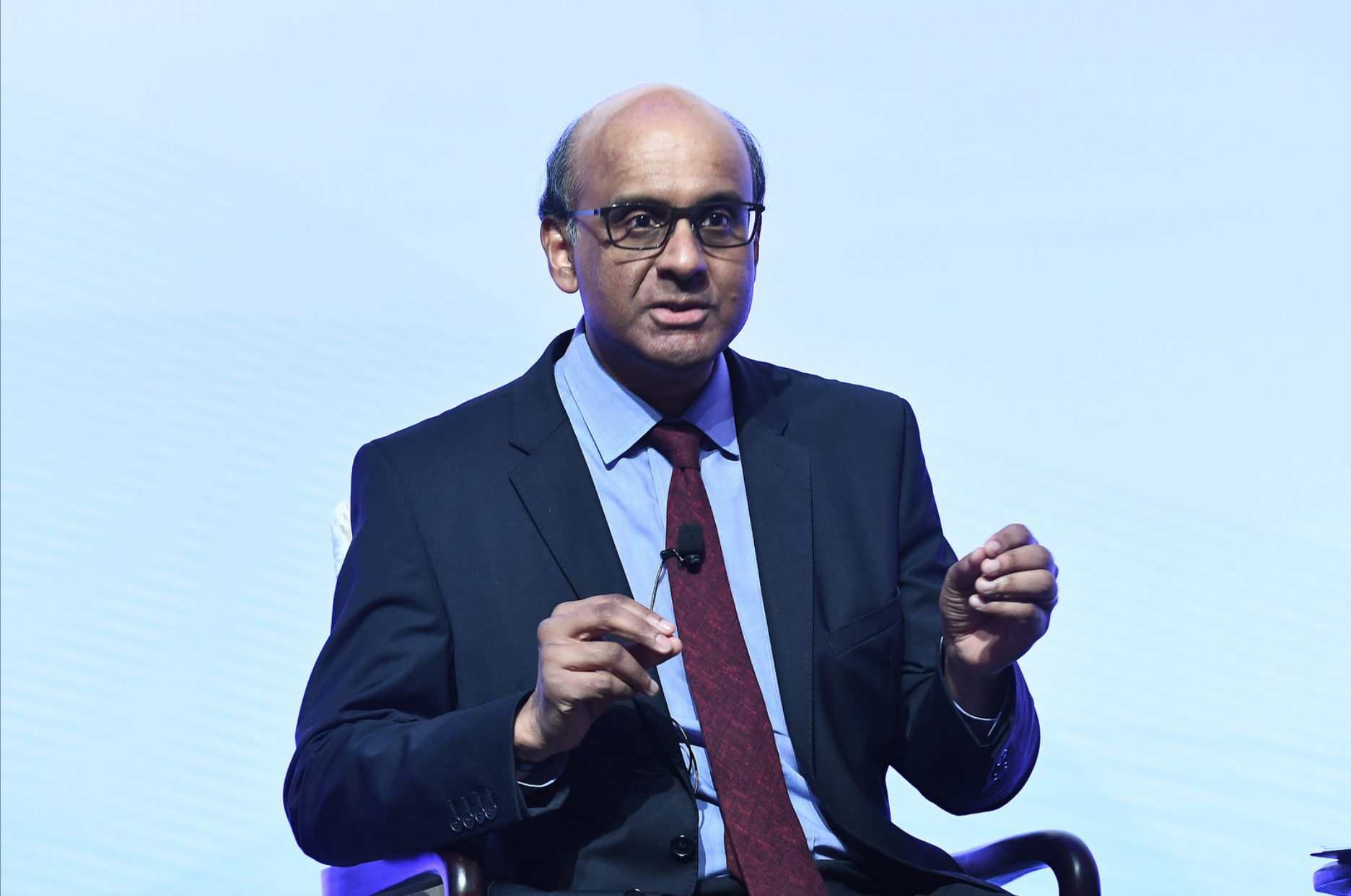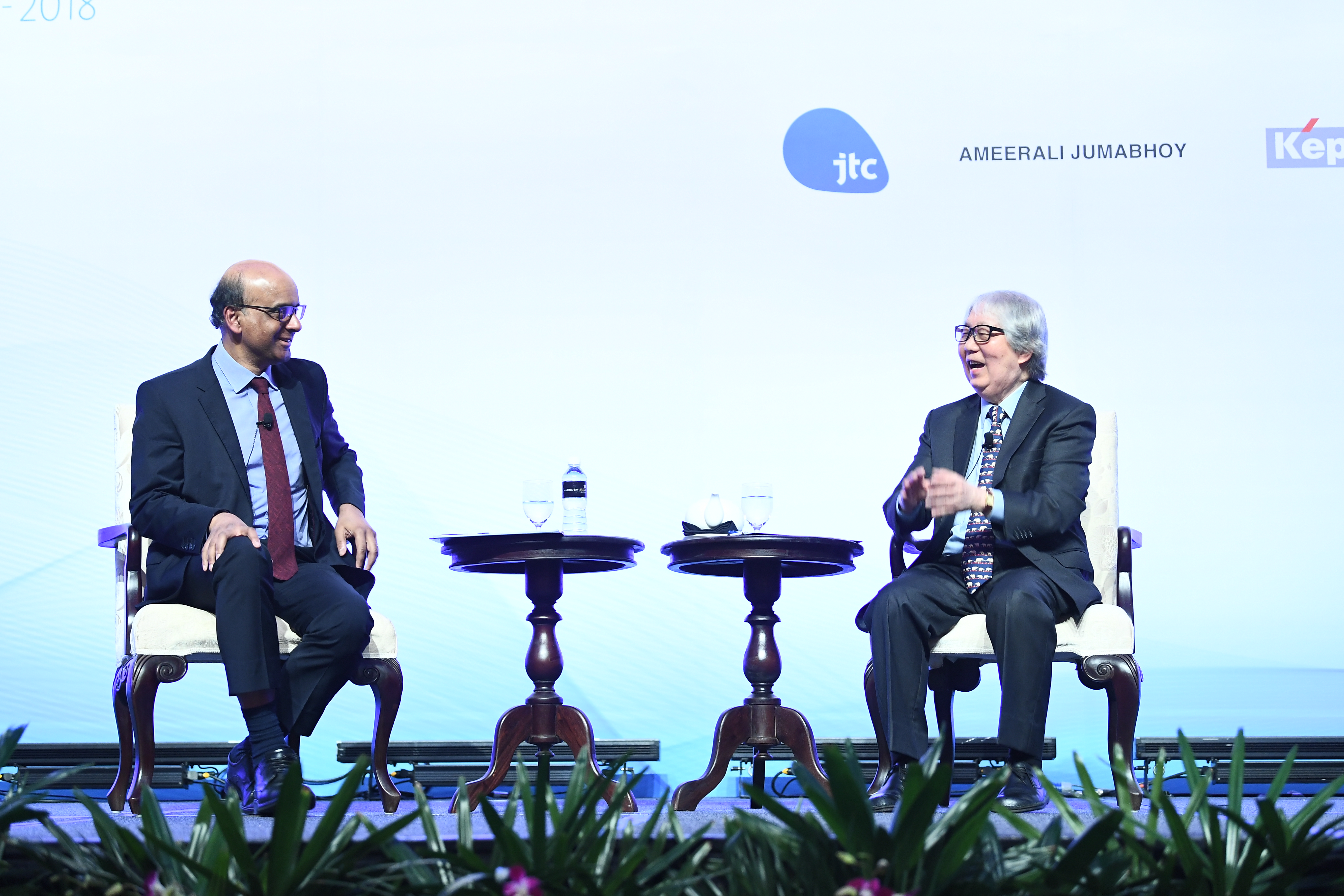Escalators. Keep the escalator moving up. Don't let the escalator stop.
Deputy Prime Minister Tharman Shanmugaratnam used this new analogy to describe how Singapore should tackle income inequality and address social mobility in the future on Thursday (Oct. 25).
Tharman was speaking at the 30th Anniversary of the Institute of Policy Studies (IPS) during a dialogue session chaired by Ambassador-at-Large and IPS Special Adviser Tommy Koh, which focused on tackling the intertwined issues of social mobility and inequality in Singapore.
Koh, as the moderator, managed to engage Tharman sharply on a number of wide-ranging issues, but not before declaring cheekily that he's "the chairman of the Tharman Shanmugaratnam fan club in Singapore".
Here are some takeaways on social mobility, minimum wage and Singapore's "social culture" from the 44-minute session:
On social mobility
1. Escalator that carries everyone up should keep moving
Three years ago, Tharman used the analogy of a "trampoline" to refer to Singapore's social and economic policies for the lower-income group.
On Thursday, Tharman used yet another analogy to refer to social mobility -- the "escalator".
All in all, Tharman used "escalator" 16 times in his dialogue with Koh.
He likened a system where everyone is moving up to an "escalator", saying it is critical to maintain it:
"Once the escalator that carries everyone up stops, the problems of inequality, and all the problems of 'me against you', 'this group against that', become much sharper, and that is exactly what has happened in a whole range of advanced economies.
Once you get stagnation in the middle of society over a long period of time, which was what happened in the U.S., and a range of other advanced countries, inequality becomes a much sharper issue - much more brittle.
And if the politics of inequality acquires a momentum of its own, it makes it harder to solve the problem of a broken escalator."
He said that in "a range of advanced countries", there is a sense of "pervasive anxiety" among the middle income group, which is why in Singapore, the "escalator" should always be kept moving for everyone.
To him, it is more important for people to be "doing better over time", rather than just be concerned about "relativities".
He said Singapore is doing well so far as the "wages of the bottom 20 per cent have been moving up, unlike many other societies".
As for how the "escalator" should be kept going, it is "staying competitive, developing capabilities in [Singapore's] economy", and "keeping the labour market tight for every category of workers."
2. Singapore has to intervene & help people early in life to keep social mobility going
Tharman also said that Singapore has to work harder at improving on its social mobility.
This can be done by "starting early in life":
"I would say, starting in fact even at the pre-natal months before a child is born.
Starting very early in life, and continuing through life to intervene to help people to do well for themselves.
It requires a consistent effort in early childhood, through the school years and in work life; investing in people at regular intervals, and taking very seriously the idea that everyone can grow.
He said the "growth mindset" has to be what defines Singaporeans:
"It doesn't matter where you start, you can grow and improve, and you can master your job."
This is a major challenge that he said few countries are succeeding at, not even egalitarian societies like Finland and Denmark, where the persistence of social class has been "remarkable over the decades".
In fact, Tharman added that these countries have seen social mobility far short from what they desire.
On Singapore's "highly progressive" low-tax regime
Tharman explained that Singapore is a low-tax society and so, it has to think hard on how it uses its tax revenue:
"We target our subsidies and benefits on the poorest of society, on those who need it the most."
He elaborated on it further, saying that Singapore's low-tax regime is "highly progressive in terms of where the benefits go":
"So if you're someone in the bottom 20 per cent of income, for every dollar of tax you pay, which is mainly GST, you get back about S$4 of benefits, which is a very progressive scheme.
(It is) more progressive than many other societies, but at a lower level of tax."
On why Singapore has no minimum wage
Taking a question from IPS' deputy director for research Gillian Koh on whether Singapore should implement a minimum wage model, Tharman explained that it is a "practical issue" while noting that the progressive wage model has been successful so far.
He also said that a minimum wage model has problems of its own, adding that "it’s not a political debate in [his] mind at all".
"We basically focus on the most vulnerable. Those whose jobs are renewed by contract. And these are contracts in an industry that is largely outsourced.
Cleaning, security, and what I call landscape workers, those who look after the estates and so on.
Five years ago, the average wage of a cleaner was a little over S$900. And today it is over S$1,200. More than a third increase in five years, and that's quite significant.
For security, the increase is even larger, something like 36 per cent.
It's about designing a ladder for wage increases based on skills and experience. And it's working quite well so far."
He further explained the "trouble with minimum wage":
"In the U.S. and elsewhere, a lot of people who benefit from the minimum wage are not people from poor families.
They may be youngsters, or anyone who's doing a job in the lower end. But a very significant proportion of them come from middle income families, so it's not very well targetted.
By focusing on cleaners, security guards and landscape technicians. We know we are trying to help.
And by the way, this is a group that is especially populated by our older workers, who are disproportionately present in those three jobs.
It's one of the ways we are helping our older folks in the workplace."
In other words, Singapore's progressive wage model helps the most vulnerable in society and has made the lower-income group better off.
On why the social culture in Singapore has to change
 Image via Jacky Ho, IPS
Image via Jacky Ho, IPS
Tharman also found the time to relate his encounter with an attendant at the lavatory, saying that it is important to do one's job with dignity even if the job is that of an attendant at the lavatory.
Koh in turn said that whether others treat such low-wage earners with dignity is another issue, adding that in Singapore, "the elite does not show respect" for cleaners, petrol station attendants and other low-wage earners.
Tharman responded by saying Singapore has to move past its social culture:
"I don't think this is only important for the elite. I think it's part of our social culture.
We inherited a combination of a set of British institutions and the East Asian culture, both of which were quite hierarchical, both of which tended to look down ordinary manual labour, and we got to move past that."
Conclusion
Despite such challenges that Singapore faces, Tharman ended the session on an uplifting note:
"Singaporeans by and large, are by nature not very class conscious.
They like to make sure that no one is doing too badly, and that they can do well together."
Tharman further encouraged Singaporeans to take an interest in one another as it is one way for the "escalator" to keep moving up:
"The culture of our interactions, the way we treat each other, whether as equals, as we grow up and as we go through life, also shapes social mobility because it spreads aspiration.
Aspiration shouldn't just be the habit of the upper middle class or the wealthy. Aspirations spread through interaction, and by having a common culture.
And social mixing is something that enriches all of us. That's the beauty of social mixing. So let's keep that in our Singaporean culture."
[related_story]
Top image via Jacky Ho, for the Institute of Policy Studies, NUS
Content that keeps Mothership.sg going
?
This is what it feels like to have your hair removed by intense bursts of light.
? vs ?
You're on the MRT. Do you read or surf?
Why not both??
If you like what you read, follow us on Facebook, Instagram, Twitter and Telegram to get the latest updates.
